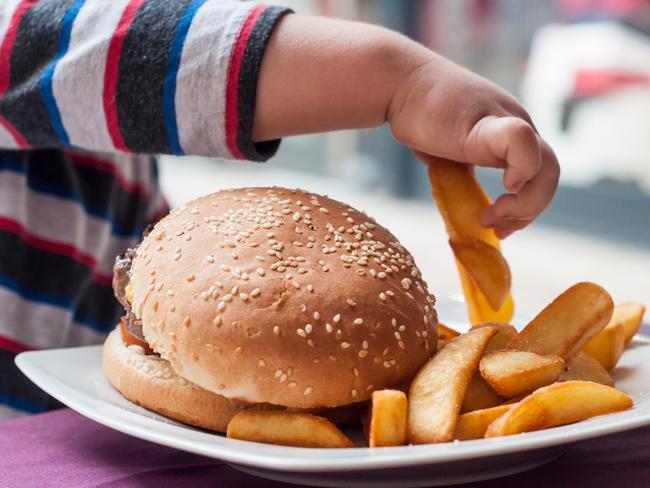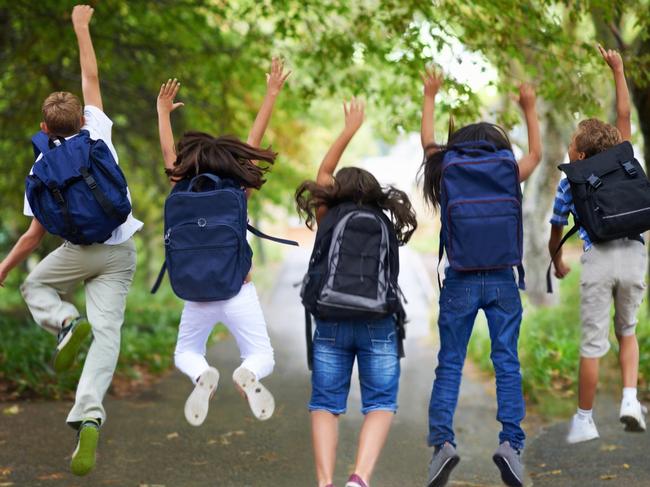School holidays blamed for adding kilos to your child’s waistline
EXPERTS say the six-week summer school holiday starting before Christmas needs to be cut back for the sake of Aussie kids’ health.
Illness
Don't miss out on the headlines from Illness. Followed categories will be added to My News.
EXCLUSIVE: SCHOOL holidays are being blamed for the nation’s childhood obesity epidemic and experts say the six week summer holiday needs to be shortened to combat the problem.
Millions of Australian schoolchildren are currently on holidays and research shows they will sleep 40 minutes longer and spend 60 minutes more per day in front of screens while on the break.
They are likely to eat more junk food and expend five per cent less energy and perform 15 fewer minutes of vigorous physical activity than when at school says University South Australian Professor Tim Olds.
The bad habits cause them to gain weight over the holiday period and even though they return to a more active lifestyle when school returns they never fully lose all the weight they gained during the break.
“Across a 10-week holiday period, this difference, uncompensated by dietary adjustment, would equate to an extra kilogram of body fat,” says Professor Olds.
MORE: YOUNG ADULTS GETTING FATTEST THE FASTEST
MORE: OBESITY CRISIS HITS PRE-SCHOOLERS

One in four Australian children are already overweight or obese setting them up for a lifetime of health problems and research suggests most of the extra weight is stacked on during school holidays.
The school holiday weight gain phenomenon is even more of a problem for already overweight children and those from poorer households.
“Wealthy families pay for tennis lessons while kids from low socio-economic families and those in remote areas have an increase in fitness and fatness that is much greater,” Professor Olds said.
A 2016 UK study found children’s BMI increased by two-and-a-half times during the summer break, rising from an average of 17.64 to 18.26 after the holidays.
While the children were able to complete 740 metres of a shuttle run test at the end of a school term they managed to run just 605 metres after they returned from holidays.
A study of more than 18,000 US primary schoolchildren that followed them from kindergarten to second grade found the prevalence of obesity increased from 8.9% to 11.5%, and the prevalence of overweight increased from 23.3% to 28.7%.
All of the increase in weight occurred during the two summer vacations.
Another US study of more than 3500 school children in Texas found on average over a six-year period the kids BMI decreased 1.5 percentile points during the school year and increased 5.2 percentile points during the summer.

University of South Australia’s Professor Tim Olds will next year carry out the first Australian research to test if the school holiday weight gain phenomenon happens here.
At least 300 9-11-year olds will have fit bits strapped to their wrist and their time use, diet fitness fatness and school performance will be measured for three years to assess the effect of school holidays on their weight gain.
Over the year children spend 15 per cent of their time at school and 25 per cent of their time on school holidays, Professor Olds said.
If we are serious about tackling childhood obesity it’s time for us to rethink the length of the summer holiday, he says.
The current six-week summer holiday evolved at a time when communities were mainly agrarian and the function of the holiday was to allow children to help with the harvest.
“This structure has endured despite increasing urbanisation and the development of airconditioning,” he said.
“The bottom line is if it is confirmed in Australia that the home environment is toxic for children the more time they spend at school the better” Professor Olds said.
“Schools are really doing a good job”.

Obesity Policy Coalition spokeswoman Jane Martin isn’t sure the long summer school holidays should be shortened but says the research pointed to the importance of the school environment in combating obesity.
“I know as a parent you treat kids a bit more on holidays and if you are working during the period it can be stressful and you take shortcuts and slip into fast food because you are out of your routine,” she said.
Parents should be mindful during the current holidays not to give their kids too many treats, watch what type of snacks they are eating and switch sugary drinks for water.
Public Health Association chief Terry Slevin says the findings are a wake-up call for parents who should see holidays as an opportunity not a threat.
“It’s a time for new adventures like a long pushbike ride, learning new skills with a ball or a bat or a racquet, earning a new swim stroke, organising a local Olympics in your street,” he says.
“On the food side spend some time in the kitchen helping kids learn to make food with natural ingredients, looking at what’s growing in the garden,” he said.
Originally published as School holidays blamed for adding kilos to your child’s waistline


